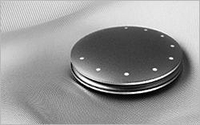
The consumer technology market is an alchemical paradox: Consumer need is the crucible of consumer desire; yet desire is also the catalyst of need,
which is cultivated by the desirability of a new product with hitherto unimagined capabilities.
A smartwatch's success depends to some extent on affordability, but affordability depends on mass
desire, which depends to some extent on the product's affordability. Ad nauseum.
At a panel dealing with wearable technology during this week's Ignition digital conference, one participant
asked for a show of hands of those who were wearing a smartwatch or a vital-signs wrist monitor along the lines of a Fuel band, Pebble, or Samsung Galaxy Gear device.
Ten hands went up. And
this was a very tech-forward audience. The key to untangle the above conundrum is the killer app, which panelists agreed has not arrived just yet.
advertisement
advertisement
"We are in the first half of the first
inning," said Sonny Vu, CEO of Misfit, which makes the Shine wearable physical activity monitor. "It's like the early days of mp3 players."
Vu said that to achieve mass-market
“wearability,” the table stakes include aesthetics and unobtrusiveness (he and other panelists noted that some of the products are -- in so many words -- the size of an armoire and about
as heavy) and not a maintenance problem when it comes to charging time and duration.
"But what's missing are the 'killer use' cases," he said. "We are all talking about sensing, biofeedback,
and reminders. There's nothing too special about the technology right now, and it's very fragmented. But it's going to get to the point where it's cheap, and it's going to require volume to get there.
Once we get to point where we can sell one hundred million or a billion a year it will be cheap. But in five years it will be multiple products that do multiple things and talk to each other."
David Eun -- EVP and head of of Samsung's Open Innovation Center, who was speaking on a panel about the evolution of television -- happened to be wearing that company's connected watch, which owns the
honor of beating Apple to the punch, although it has received fairly lukewarm reviews. He used the device to make a point about another kind of evolution: the shorter-term product development process.
"Last year Samsung electronics devoted a quarter of the workforce to R&D," he said. "We spent $10.8 billion on R&D last year."
That, he said, informed the device on his wrist -- the
reviews of which don't bother him, or his company, he says, because it's better to start somewhere and cultivate what you have. His point was that while first-mover products are "walking point"
through a mine field of negative reviews, the company shouldn't be the one planting the mines. That risk is inherent to R&D.
"This is a first-generation device," he said of the Galaxy
Gear watch. "My analogy is tomatoes: small green tomatoes. You take care of them so they can become big, red ripe tomatoes. Don't cut it too early and don't criticize it for not being big, red,
ripe."